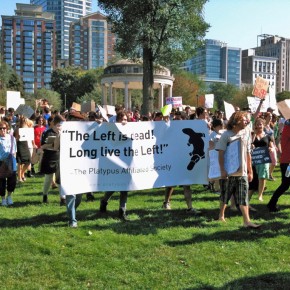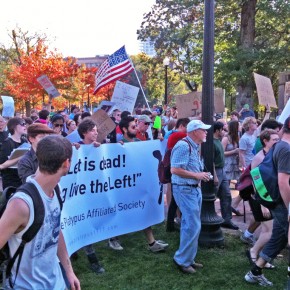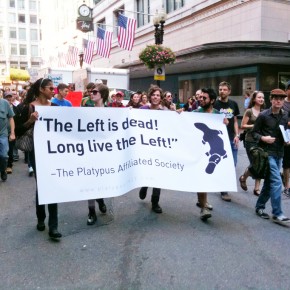The Platypus Affiliated Society in Boston presents
A Public Forum
The 3 Rs: Reform, Revolution, and "Resistance"
— the problematic forms of "anticapitalism" today —
Monday 16 April 2012, 6:30-8:30PM
Encuentro 5, 33 Harrison Ave, 5th floor, Boston, MA 02111 (map)
"Reform, Revolution, Resistance": what kind of weight do these categories hold for the Left today? How are they used, to where do they point, and what is their history? The discussion concerns a question that has renewed immediacy in light of the Occupy movement.
Location - Encuentro 5, 33 Harrison Ave, Boston, MA 02111. (map)
Time - Monday, April 16, 2012 | 6:30pm until 8:30pm
http://www.facebook.com/events/423855730963519/
Speakers:
Gayge (Common Struggle Libertarian Communist Federation)
Joe Ramsey (Kasama Project)
Laura Lee Schmidt (Platypus)
J. Phil Thompson (MIT)
Jeff Booth (Socialist Alternative)
For more details, contact at boston@platypus1917.org. Latest updates can be found on our Facebook page http://www.facebook.com/groups/146774129298/
RSVP for the event here: http://www.facebook.com/events/423855730963519/
"[After the 1960s, the] underlying despair with regard to the real efficacy of political will, of political agency [. . .] in a historical situation of heightened helplessness [. . .] became a self-constitution as outsider, as other [. . .] focused on the bureaucratic stasis of the [Fordist/late 20th Century] world: it echoed the destruction of that world by the dynamics of capital [with the neo-liberal turn after 1973, and especially after 1989].
The idea of a fundamental transformation became bracketed and, instead, was replaced by the more ambiguous notion of 'resistance.' The notion of resistance, however, says little about the nature of that which is being resisted or of the politics of the resistance involved — that is, the character of determinate forms of critique, opposition, rebellion, and 'revolution.' The notion of 'resistance' frequently expresses a deeply dualistic worldview that tends to reify both the system of domination and the idea of agency.
'Resistance' is rarely based on a reflexive analysis of possibilities for fundamental change that are both generated and suppressed by [the] dynamic heteronomous order [of capital]. ['Resistance'] is an undialectical category that does not grasp its own conditions of possibility; that is, it fails to grasp the dynamic historical context of which it is a part."
— Moishe Postone, "History and Helplessness: Mass Mobilization and Contemporary Forms of Anticapitalism" (Public Culture 18:1, 2006)
Live broadcast: www.livestream.com/platypus1917
Saturday, December 17, 2011
9AM U.S./Canada PST / 10AM MST / 11AM CST / 12PM EST;
and 17:00 London / 18:00 Frankfurt and Berlin /
19:00 Thessaloniki / 22:30 Delhi / 02:00 Seoul
If you are in Chicago:
Saturday, 11am | 17 December 2011 |School of the Art Institute of Chicago, 112 S. Michigan Ave. room 919
Please join Platypus for a brief introduction to and discussion about the relevance of Lenin today, in anticipation of our Winter-Spring 2012 primary Marxist reading group, on the history of revolutionary Marxism, centered on the writings of Lenin, Luxemburg, Trotsky, and Adorno.
The Encyclopedia Britannica's entry on Lenin states that,
"If the Bolshevik Revolution is -- as some people have called it -- the most significant political event of the 20th century, then Lenin must for good or ill be considered the century's most significant political leader. Not only in the scholarly circles of the former Soviet Union, but even among many non-Communist scholars, he has been regarded as both the greatest revolutionary leader and revolutionary statesman in history, as well as the greatest revolutionary thinker since Marx."
Lenin is the most controversial figure in the history of Marxism, and perhaps one of the most controversial figures in all of history. As such, he is an impossible figure for sober consideration, without polemic. Nevertheless, it has become impossible, also, after Lenin, to consider Marxism without reference to him. Broadly, Marxism is divided into avowedly "Leninist" and "anti-Leninist" tendencies. In what ways was Lenin either an advance or a calamity for Marxism? But there is another way of approaching Lenin, which is as an expression of the historical crisis of Marxism. In other words, Lenin as a historical figure is unavoidably significant as manifesting a crisis of Marxism. The question is how Lenin provided the basis for advancing that crisis, how the polarization around Lenin could provide the basis for advancing the potential transformation of Marxism, in terms of resolving certain problems.
The Frankfurt School Critical Theorist Theodor Adorno, in his 1966 book Negative Dialectics, wrote of the degeneration of Marxism due to "dogmatization and thought-taboos." There is no other figure in the history of Marxism who has been subject to such "dogmatization and thought-taboos" as much as Lenin.
It is important to note as well that Adorno himself sought to remain, as he put it, "faithful to Marx, Engels and Lenin, while keeping up with culture at its most advanced," to which his colleague Max Horkheimer replied, simply, "Who would not subscribe to that?"
Today, such a proposition seems especially implausible, in many ways. Yet perhaps the memory of Lenin haunts us still, however obscurely.
The discussion will be broadcast live on the web. Additionally, a recording will be made available after the event.
Recommended background readings:
"1917"
http://platypus1917.org/2009/11/18/the-decline-of-the-left-in-the-20th-century-1917/
"Lenin's liberalism"
http://platypus1917.org/2011/06/01/lenin%E2%80%99s-liberalism/
"Lenin's politics"
http://platypus1917.org/2011/09/25/lenins-politics/
UPDATE: Noam Chomsky's talk has been moved to Saturday Oct. 22 due to the rain. Platypus will still be in attendance. The time hasn't been determined. Time: 6:00 PM. Dewey Square, Boston, MA.
Please make sure to coordinate with us at boston@platypus1917.org or use the contact tab.
This week, on 19th Oct 2011, the MassArt Coffee Break will meet at Dewey Square to attend a talk by Noam Chomsky.
Saturday, Oct 22| 6:00 PM
Noam Chomsky at OccupyBoston
FSU Soapbox, Dewey Square occupation.

Time: Thursday, October 13 · 6:00pm - 9:00pm
Place: CGIS South Building, Room, S050 Harvard University (Map: http://goo.gl/UoiC1)
Facebook: http://www.facebook.com/event.php?eid=244226975629516
Contact: boston [at] platypus1917 [dot] org
Battle on Wall Street?
Part 1 of 2-part film screening series: Wall Street: Money Never Sleeps (2010)
"Want to know what the mother of all bubbles was? Came out of nowhere, by chance. They called it the Cambrian Explosion. It happened around 530 million years ago. And, over the next 70-80 million years, the rate of evolution accelerated so fast that we came along, the human race. They still can't explain how that happened, except that it happened. Some people say it was by chance. Others, design. But who really knows?"
The recent #occupy protests depart significantly from the anti-war politics that has defined activism on the Left for the past decade. Slogans decrying corporate greed now dominate the picket signs that until recently were used to condemn U.S. imperialism. However, does this spreading protest movement signal a new era of activism in the U.S.? Or, are these recent demonstrations expressing old and familiar discontents? Perhaps, as the role of Adbusters suggests, something of the 1990s has come back into vogue, bringing back to the fore the age-old hatred of the bankers and impersonal financial institutions, and opposition to neoliberal globalization, now in crisis. The spirit of the 1999 Seattle protest against the World Trade Organization seems to have returned, with a vengeance. Please join Platypus in considering the historical sources of the ongoing anti-Wall Street protests through the lens of two recent films that highlight the popular imagination of contemporary capitalism and its discontents.
Here are a few pictures of Platypus at Occupy Boston. On 10th Oct 2011, students from 20+ universities in/around Boston participated in a march to Dewey Sq. Platypus was there, handing out fliers and talking to people.





